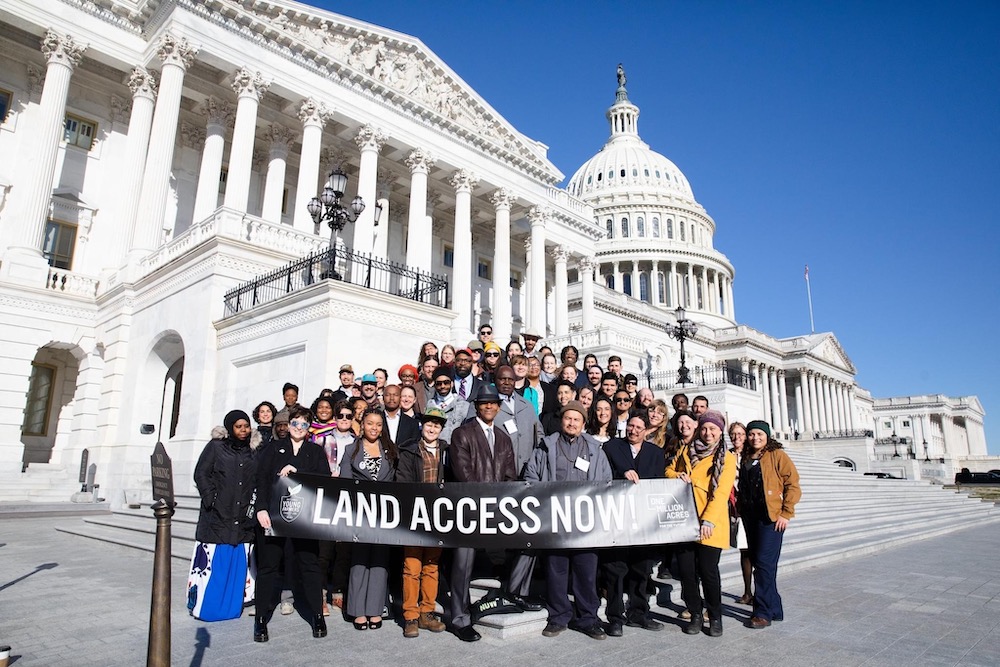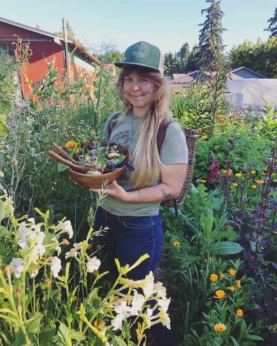Opinion: Farmers Are Dropping Out Because They Can’t Access Land. Here’s How the Next Farm Bill Could Stop the Bleeding.
It’s crucial that the next farm bill includes the Increasing Land Access, Security, and Opportunities Act. Here’s why.
Opinion: Farmers Are Dropping Out Because They Can’t Access Land. Here’s How the Next Farm Bill Could Stop the Bleeding.
It’s crucial that the next farm bill includes the Increasing Land Access, Security, and Opportunities Act. Here’s why.

The Increasing Land Access, Securities, and Opportunities Act would authorize $100 million in annual funding for community-led land access solutions.by Tom Daly Photography.
As a teenager, I distinctly remember my father telling me to not follow in the family business. I now know he said this to shield me from the many hardships farmers continue to face. America’s farmers, especially beginning and Black, Indigenous and People of Color (BIPOC) farmers face insurmountable challenges, yet 87 percent of young farmers are dedicated to regenerative, climate-smart farming practices. Today’s beginning farmers are passionate about growing nourishing foods, diversified crops and building soil; yet because of astronomical real estate costs, most farmers are unable to purchase land on which to operate.
The farm bill is a critical bipartisan package of legislation that renews every five years, and it expired on September 30, 2023. To avert a government shutdown, the Senate passed an extension bill to keep the essential programs running through the end of September 2024. This tightrope omnibus bill funds the SNAP program, farmer subsidies and USDA loan programs and grants. Eaters and farmers alike depend on this bill to get food on the table.
As a farmer’s daughter and farm advocate, I know that the farm bill has one of the greatest impacts on what you eat, how that food was grown and the ability of beginning farmers to find land in the first place. Many of my friends are farmers and I’ve seen them struggle against countless barriers, especially when it comes to accessing or purchasing land. In a recent National Young Farmers Coalition survey, 59 percent of young farmers named finding affordable land to buy as “very or extremely challenging.”
I’ve come to understand that despite where a farmer lives or what they grow, the lack of affordable land to farm is the number one reason farmers are leaving agriculture, the top challenge for current farmers and the primary barrier preventing aspiring farmers from getting started. The next farm bill can fix this.
Oregon agriculture is a part of my identity. I grow small-scale herbs, seeds and nursery starts in my backyard garden and work in the nonprofit agriculture world. My Land Advocacy Fellowship with the National Young Farmer Coalition empowered me to share my experience of growing up on the family farm with my senators and representatives offices on Capitol Hill in Washington, D.C.

In June 2023, the United States Department of Agriculture (USDA) announced the awardees of the $300-million Increasing Land, Capital, and Market Access Program, which included 50 community-based projects for underserved farmers, ranchers and forest landowners. Three projects were funded here in Oregon, led by the Black Oregon Land Trust, Indian Land Tenure Foundation program and Community Development Corporation of Oregon. This program resulted in federal dollars going out the door, directly benefiting community-led land access solutions. It was also a one-time funding opportunity that I believe should be made permanent.
Following the creation of that one-time program, the bipartisan Increasing Land Access, Securities, and Opportunities Act (LASO) was introduced in both the House and the Senate. The LASO Act would expand on the promise of the Increasing Land, Capital, and Market Access Program. If enacted, this bill would authorize $100 million in annual funding for community-led land access solutions through the next farm bill. This would be a significant victory for young farmers, ranchers and everyone who has been fighting to win federal funding to address issues of equitable land access.
Flying to Washington, D.C with farmer Michelle Week of Good Rain Farm really impacted me. Hearing her experience of feeding more than 150 families in her Community Supported Agriculture (CSA) subscription yet still unable to afford to purchase farmland as an Indigenous woman in the Portland Metro area is alarming.
Across the country, farmland is being lost to development at a rate of more than 2,000 acres per day. Over the next 20 years, nearly half of US farmland is expected to change hands. Additionally, Black farmers across the United States have lost 90 percent of their historic farmland due to systemic racism and discriminatory lending. Today, according to the most recently available statistics, 95 percent of farmers are white in the United States and 96 percent of land owners are white. For these reasons and more, I advocate for federal reparations in the form of land access through the LASO bill.
We all eat and, in order to eat, we all need farmers. I hope you’ll consider getting in contact with your members of Congress today and urge them to support farmers by asking them to include the Increasing Land Access, Security, and Opportunities Act (H.R.3955, S.2340) in the next farm bill. With the current farm bill temporarily extended, it’s a pivotal moment to uplift critical policy changes like the LASO Act and invest in the health and well-being of our communities, our food system and the future we all deserve.
Carly Boyer (she/they) is a fourth-generation land manager, stewarding 140 acres in Polk County, OR. She works for Oregon Climate and Agriculture Network, an agricultural non-profit focused on Soil health. She is a board member for Rogue Farm Corps, a beginning farmer program and a Land Advocacy Fellow with the National Young Farmers Coalition advocating for the One Million Acres for the Future Farm Bill campaign in Washington, D.C.
Follow us
This work is licensed under a Creative Commons Attribution-NoDerivatives 4.0 International License.
Want to republish a Modern Farmer story?
We are happy for Modern Farmer stories to be shared, and encourage you to republish our articles for your audience. When doing so, we ask that you follow these guidelines:
Please credit us and our writers
For the author byline, please use “Author Name, Modern Farmer.” At the top of our stories, if on the web, please include this text and link: “This story was originally published by Modern Farmer.”
Please make sure to include a link back to either our home page or the article URL.
At the bottom of the story, please include the following text:
“Modern Farmer is a nonprofit initiative dedicated to raising awareness and catalyzing action at the intersection of food, agriculture, and society. Read more at <link>Modern Farmer</link>.”
Use our widget
We’d like to be able to track our stories, so we ask that if you republish our content, you do so using our widget (located on the left hand side of the article). The HTML code has a built-in tracker that tells us the data and domain where the story was published, as well as view counts.
Check the image requirements
It’s your responsibility to confirm you're licensed to republish images in our articles. Some images, such as those from commercial providers, don't allow their images to be republished without permission or payment. Copyright terms are generally listed in the image caption and attribution. You are welcome to omit our images or substitute with your own. Charts and interactive graphics follow the same rules.
Don’t change too much. Or, ask us first.
Articles must be republished in their entirety. It’s okay to change references to time (“today” to “yesterday”) or location (“Iowa City, IA” to “here”). But please keep everything else the same.
If you feel strongly that a more material edit needs to be made, get in touch with us at [email protected]. We’re happy to discuss it with the original author, but we must have prior approval for changes before publication.
Special cases
Extracts. You may run the first few lines or paragraphs of the article and then say: “Read the full article at Modern Farmer” with a link back to the original article.
Quotes. You may quote authors provided you include a link back to the article URL.
Translations. These require writer approval. To inquire about translation of a Modern Farmer article, contact us at [email protected]
Signed consent / copyright release forms. These are not required, provided you are following these guidelines.
Print. Articles can be republished in print under these same rules, with the exception that you do not need to include the links.
Tag us
When sharing the story on social media, please tag us using the following: - Twitter (@ModFarm) - Facebook (@ModernFarmerMedia) - Instagram (@modfarm)
Use our content respectfully
Modern Farmer is a nonprofit and as such we share our content for free and in good faith in order to reach new audiences. Respectfully,
No selling ads against our stories. It’s okay to put our stories on pages with ads.
Don’t republish our material wholesale, or automatically; you need to select stories to be republished individually.
You have no rights to sell, license, syndicate, or otherwise represent yourself as the authorized owner of our material to any third parties. This means that you cannot actively publish or submit our work for syndication to third party platforms or apps like Apple News or Google News. We understand that publishers cannot fully control when certain third parties automatically summarize or crawl content from publishers’ own sites.
Keep in touch
We want to hear from you if you love Modern Farmer content, have a collaboration idea, or anything else to share. As a nonprofit outlet, we work in service of our community and are always open to comments, feedback, and ideas. Contact us at [email protected].by Carly Boyer, Modern Farmer
March 12, 2024
Modern Farmer Weekly
Solutions Hub
Innovations, ideas and inspiration. Actionable solutions for a resilient food system.
ExploreExplore other topics
Share With Us
We want to hear from Modern Farmer readers who have thoughtful commentary, actionable solutions, or helpful ideas to share.
SubmitNecessary cookies are absolutely essential for the website to function properly. This category only includes cookies that ensures basic functionalities and security features of the website. These cookies do not store any personal information.
Any cookies that may not be particularly necessary for the website to function and are used specifically to collect user personal data via analytics, ads, other embedded contents are termed as non-necessary cookies.
Unless we adopt policies that address the long-standing tradition of devaluing our food, new entrant farmers will continue to be pushed towards lower value and higher risk lands. Meanwhile, existing farmers are often tasked with gleaning greater production from the land, despite the possible environmental implications of more intensive practices. We need to create a food system that adequately values nutritious food, respects the environment where it is produced, and provides living wages to the communities that produce it.
Amen to Melanie Harrison. We, consumers, demand lots of cheap food, driving these chemical companies and agribusinesses to create ever more destructive practices to satisfy our insatiable appetite.
New farmers will continue to be pushed to lower-value and higher-risk lands unless we change our policies about the long-standing practice of devaluing our food. At the same time, existing farmers are often told to get more from the land, even if that means using it more intensively, which could have negative effects on the environment.